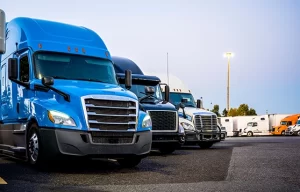Navigating a new era of change
Standing at the edge of a new era, the trucking industry is evolving and adapting as it works to combat its past challenges. And it’s a smart move in our fast-paced world, with many trucking companies who embrace the changes enjoying lasting growth and improvements in their service.
From electric and alternative fuel vehicles to emission reduction strategies and infrastructure development - the sector is proving it can adapt and seize opportunities better than most other sectors. With its commitment steadfast in the face of various infrastructure and policy hurdles - the trucking industry is keeping up with the ever-evolving expectations of the global supply market.
So, let’s explore exactly where the industry is headed in 2024.
Overview of trucking trends in 2024
Global supply chains are an intricate web of huge importance. And within that web, truck drivers play one of the most pivotal roles in ensuring goods are transported seamlessly from source to destination. Fueled by advancements in technology and sustainability - the trucking industry is experiencing a significant transformation this year.
Technology integration and advancement
The trucking sector is witnessing a major surge in the development of software such as top-notch analytics. Acting to boost the efficiency of the supply chain by assisting drivers in a multitude of ways including route planning. Other technological advancements just like this are changing the way goods are being transported worldwide, as well as helping to reduce carbon emissions and make trucking more eco-friendly. Let’s look at the key technologies shaping the future of the trucking industry.
Driver Safety Monitoring
Investments in cutting-edge technology to improve driver safety standards is a key evolution we are seeing in 2024. Departure warnings, blind spot monitoring and adaptive control - these collision mitigation technologies are helping truckers stay safe on the road which in turn contributes to productivity and fewer accidents. Other systems, like autonomous braking and collision avoidance, reduce their chances of making a mistake due to tiredness.
Autonomous Trucks
Equipped with huge technological advancement - autonomous trucks are a hallmark in the revolutionisation of the trucking industry. Reducing the need for human drivers - these self-driving vehicles are increasing productivity, safety, and cutting costs for the sector. Across the globe, self-driving trucks are becoming an industry standard as they help to alleviate driver shortages and allow more cargo to be transported at a faster and more affordable rate.
Mobile Apps
Staying organised, making on-time deliveries, and receiving crucial real-time information are just some of the benefits truck drivers are experiencing thanks to tailored mobile applications. Additionally, mobile apps are providing a more streamlined administrative process for payroll and billing, as well as better communication between drivers and dispatchers.
Route Optimisation
Employing data-driven algorithms to determine the best route for a fleet of vehicles - dynamic routing is increasing the speed of the trucking industry. Based on parameters such as cost, time, weight, distance, safety, and customer preferences - dynamic routing is expediting delivery by finding the optimal route to the destination in real-time.
Fleet Management Software
Fleet management software is another technological advancement trucking companies are reaping the benefits of. This software is providing insight into truck fleets and their performance, as well as driver performance and vehicle upkeep. By gathering data from vehicle tracking systems - vehicle miles and maintenance metrics can be used to identify any issues, as well as risky driving, excessive speed, and aggressive driving via predictive analysis.
AI and Telematics
AI in analysing telematics data allows for real-time adjustments and foresight. Offering considerable cost saving and improved safety measures - these technologies prevent issues before they arise. Ensuring fleet operation at peak efficiency, AI Telematics also offer predictive analytics for maintenance, route optimisation and driver performance.
Digital freight platforms
Boosting the speed and reliability of freight logistics - digital freight platforms have marked a vital step forward in the trucking sector. Working to streamline the connection between shippers and carriers, these platforms are cutting down the number of empty miles and manual brokerage time. As an additional benefit, this technology utilises AI to enhance the cargo and transportation matchmaking process.
Sustainability and green initiatives
Sustainability and green initiatives also have a foothold on the trucking industry this year as countries across the globe increase efforts to reduce their environmental footprint. Despite ongoing challenges within the sector, this commitment has remained steadfast with a number of green trucking practices established to reduce the overall carbon footprint of the industry.
Why are companies moving to green trucking?
The concept of sustainability is the fastest growing global trend in recent years. And when sustainability is viewed as a matter of survival for a business - massive changes can be made.
But in addition to business survival, there are a number of other reasons why trucking companies are choosing to adopt eco-friendly practices. From minimising their environmental impact and carbon footprint, to avoiding the increasing cost of fuel and reducing their emissions.
In 2022, Australia’s transport sector made up 19% of the country’s total emissions. Without intervention - the transport sector was projected to be Australia’s largest source of emissions by 2030. With the following eco-friendly practices being adopted by many trucking companies - hopefully this statistic will never come to fruition.
Top Green Trucking Practices
Eco-friendliness as a competitive edge
With digital innovation and green initiatives at the forefront of the sector’s evolution, trucking companies are not only working hard to reduce their environmental impact, but seeing it as a competitive edge. With a high statistic (almost 90%) of customers aligning with sustainable and ethical trucking companies - people are viewing companies that employ eco-friendly practices as more responsible.
Infrastructure development
To support the trucking commitment to eco-friendly practices across the country, the development of infrastructure such as charging and fueling stations is crucial. Without this infrastructure, many of the efforts to reduce emissions and carbon footprints will be mute. This infrastructure is an essential part of the mission to support the growing adoption of electric and alternative fuel vehicles.
Carbon Capture Technology
With carbon capture technology, truck carbon dioxide emissions are able to be captured and stored before they are released in the atmosphere. Trucking companies are adopting this technology to reduce their carbon footprint and make their operations more environmentally friendly. Other emission reduction strategies being implemented by trucking companies include aerodynamic enhancements, low-resistance tires, adoption of alternative fuels and electric vehicles, and government regulations and incentives.
Route Optimisation
Reducing the amount of time spent in traffic jams and bad weather conditions is a key way trucking companies are reducing emissions and stress on truck drivers. Many companies are doing this through AI programs to optimise routes and predict weather and traffic. This route optimisation is also implemented via adopting smoother driving habits on highways and avoiding slamming on the breaks.
Alternative Fuel: Electric and alternative-fuel vehicles
Many truck driving companies are looking at alternative fuel solutions for their fleets. Compressed Natural Gas (CNG), renewable diesel, and electricity - these are the most popular fuel choices for trucks in Australia.
Compressed Natural Gas - One of the most popular alternatives to diesel is CNG. Emitting up to 30% less greenhouse gases than oil-based fuels like diesel - CNG is a good option for reducing the carbon footprint of a trucking company.
Renewable diesel - Renewable diesel is a type of fuel made from renewable resources like vegetable oils, animal fats, and used cooking oil. Though chemically similar to regular diesel, renewable diesel has a higher cetane number which makes it burn cleaner and produce fewer emissions.
Electric trucks - Cheaper costs and no emissions - electric trucks are a clear winner for eco-friendly trucking. Only having recently become viable for long haul trucking, companies switching to electric trucks no longer have to worry about their impact in the environment. Electric trucks are still more expensive than diesel trucks, but the price difference is reducing every year.
Conclusion
After reading this guide, it should be clear that technology has provided revolutionary changes to the trucking industry in recent years. Improved safety, efficiency, and cost-effectiveness are some of the key outcomes many companies in the sector are experiencing while witnessing record growth in their operations. With these advancements in technology and green initiatives - the trucking industry looks forward to a future in line with the ever-evolving needs and wants of the global supply market.
Looking to finance your new truck?
Jade Finance has an extensive list of more than 80+ lenders to find the perfect deal for you.
Purchasing a new heavy vehicle is a major business investment and deserves detailed consideration of all aspects. Heavy vehicles loans can be structured over many years, so it’s important to be sure you are securing the best deal upfront to deliver your long term objectives. At Jade, we can source finance for just about every type and brand of truck on the market. Our loan types include Chattel Mortgage, Leasing, Operating Lease, Commercial Hire Purchase, and Rent to Buy/Rent to Own.
To determine which type of loan will work for you - get in touch with one of our dedicated expert brokers. Call us on 1300 000 003 or Request a Quote.


 " alt="">
" alt="">